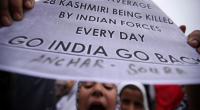 India’s decision to 'integrate' the Jammu and Kashmir territory with its mainland---for that is what the abrogation of Articles 370 and 35a really means--- is a timely strategic decision to ensure regional stability over the next few decades. Delhi’s move needs to be evaluated in the context of the proposed withdrawal of US troops from Afghanistan. When the bulk of American soldiers leave Afghanistan, the Taliban will emerge as a major political stakeholder in Kabul. With its special leverage vis-à-vis the Taliban, Pakistan, totally checkmated on it's East, is eyeing a bigger role in the affairs of a post-settlement Afghanistan to its West.
India’s decision to 'integrate' the Jammu and Kashmir territory with its mainland---for that is what the abrogation of Articles 370 and 35a really means--- is a timely strategic decision to ensure regional stability over the next few decades. Delhi’s move needs to be evaluated in the context of the proposed withdrawal of US troops from Afghanistan. When the bulk of American soldiers leave Afghanistan, the Taliban will emerge as a major political stakeholder in Kabul. With its special leverage vis-à-vis the Taliban, Pakistan, totally checkmated on it's East, is eyeing a bigger role in the affairs of a post-settlement Afghanistan to its West.
Making political predictions is always a notoriously hazardous pursuit. Yet, once the US pulls out of Afghanistan leaving behind a token 8500 soldiers at crucial centres, as its recent moves in Syria, there is little doubt that Islamabad would train its sights Eastwards, to rev up its sponsored anti-Indian agitations in Kashmir. All indications suggest there will be a fresh uptick in violent incidents in the Kashmir valley in the medium term, Article 370 or not.
Essentially then, what the abolition of special status for the Kashmir region has ensured for India is much freer hand for its army and law enforcing agencies to handle whatever trouble occurs. The iron fist will not be used unless provocations occur. The primary objective as announced is to ensure economic development and the restoration of basic rights for the long exploited groups. The latter include Buddhist Ladakhis, scores of non-Islamic tribes, Hindus, Muslim women, unemployed youths and poorly looked after communities and their children.
Now that the average Kashmiri is subject to common Indian laws and its Constitution, any special groups, pro-Pak entities like the Hurriyat Conference and Pak-backed actors will find their manoeuvrability much curtailed. Ditto for parties favouring ‘soft secession’ such as the National Conference led by the Abdullahs and the Peoples Democratic Party (PDP) led by the Muftis.
 As of now, there is no doubt that the situation in the valley is not entirely peaceful, with several incidents of stone-throwing reported so far. However, only one person, a driver has been killed accidentally. True, the area still remains virtually cut-off but the level of violence has been much lower than apprehended.
As of now, there is no doubt that the situation in the valley is not entirely peaceful, with several incidents of stone-throwing reported so far. However, only one person, a driver has been killed accidentally. True, the area still remains virtually cut-off but the level of violence has been much lower than apprehended.
The Delhi-based political establishment is also pleasantly surprised over the lack of much international reaction, let alone any condemnation of its decision regarding Kashmir. Even Muslim countries have not shed tears over the issue. Nor have the bulk of Indian Muslims, numbering as much Pakistanis themselves, reacted in anger!
Islamabad has partially succeeded in whittling down the goodwill and political influence India enjoyed with Kabul. There is every indication that its attitude will further harden against India, post-Aug 5. It has disallowed transit rights to India through its territory, cutting off its trade routes to the CIS countries. This has prompted India to develop the Chabahar port in Iran in association with the active help of Tehran and Kabul, to effectively bypass Pakistan land space and its territorial waters.
The latest instance of Pak representatives attending a meeting to discuss a political settlement in Afghanistan to end the civil war there, with their American, Chinese and Taliban counterparts without any representation from India, sent a strong negative message to Delhi. Despite its mildly- worded denial of motive to keep out India out of these talks, it was clear that China too supported Pakistan.
China has invested in its ambitious OBOR infra projects in Pakistan in a major way, promising 60 billion dollars. It is happening even as Pakistan stands blacklisted by FATF arrangements and few advanced countries consider it an investment destination. China’s OBOR projects help the economic development of Pakistan. They consolidate its infra sector, improving power supply and reinforcing tourism. The long terms financial benefits go to China financially and reduces Pakistan to a vassal state, But it claims to be an all-weather friend for Pakistan.
 As for India, despite its often contemptuous denials, China sees it more as a regional competitor in the South sea region and elsewhere. Keeping India out of ongoing peace talks over Afghanistan, therefore, suits both Pakistan and China.
As for India, despite its often contemptuous denials, China sees it more as a regional competitor in the South sea region and elsewhere. Keeping India out of ongoing peace talks over Afghanistan, therefore, suits both Pakistan and China.
India’s ties with the Taliban show a love-hate pattern. Initially, the Pashtuns, whose iconic subcontinental leader the late Khan Abdul Gaffar Khan was very close to the Indian National Congress, were warmly disposed towards India. However, this changed during the Soviet invasion of Afghanistan and India’s broad support for Moscow’s policies. India did not have much choice. It could not ignore Russia’s strong and consistent support over the Kashmir issue.
As the Afghans sought to throw out the Russians, they were materially supported by the US, Pakistan and other Western bloc countries. India got edged out here, as Pakistan got a new lease of life and world eminence. It was being wooed by both China and the Western bloc, under the much-hated dictator President Zia Ul Haq.
It would take years more for the Americans to become convinced of Indian arguments about Pakistan being a terror-sponsoring country which posed a threat not only to India, its regional neighbours, and the world at large. The Americans experienced first-hand Pakistani duplicity in running with the Taliban and hunting with the West, only after repeated failures of expensive joint initiatives in combating terror in the region. The complicity of the Pak administration in helping Osama Bin laden with ironclad security against the American worldwide campaign to find him drove the final nail into the coffin of US-Pak understanding. The reduction in financial and military help to Pakistan under President Trump and his repeated public warnings to Islamabad to give up its sponsoring of terror, often delivered in objectionable language, was ample proof of the end of the long US-Pak honeymoon.
 But in Afghanistan, the fact remains that without active assistance from Pakistan because of locational reasons, the US cannot make much headway in negotiations with the Taliban.
But in Afghanistan, the fact remains that without active assistance from Pakistan because of locational reasons, the US cannot make much headway in negotiations with the Taliban.
Even such diplomatic respite for Pakistan as far as the US and the West are concerned, could be short-lived. Islamabad stands thoroughly exposed on the world arena as a terror sponsor. Pakistan is paying a high price for its criminalised image over the Kashmir issue. Once the Afghan peace formula is worked out, its utility for the West would get downgraded automatically. Net outcome: Pakistan could turn officially into a Chinese colony, reduced to continuing its hit-and-run games against India. But Kashmir has turned into a lost cause for Islamabad and the sooner Pakistani establishment understands this, the better it will be for South Asia and beyond, according to Delhi-based analysts.
But in the days ahead, as stated before, Pakistan and its agents in the valley would stir up trouble in the Kashmir valley through cross border raids and attacks, sabotage, ambushes and killings of prominent people in the valley.
However, Pak leaders accuse India rightly or wrongly of creating trouble for Islamabad in Baluchistan and the POK already. If there is any deterioration in the law and order situation in those areas, even China would be worried, as many of its OBOR projects are located in Baluchistan! Already the Chinese have begun talking to the anti-Pak Baluchi leadership, much to Islamabad’s chagrin. Therefore Kashmir might continue to bleed and Indian forces may still remain engaged there. But the long damage to Pakistan would be severe and could threaten its own long term survival -- except as an undeclared colony of China.


